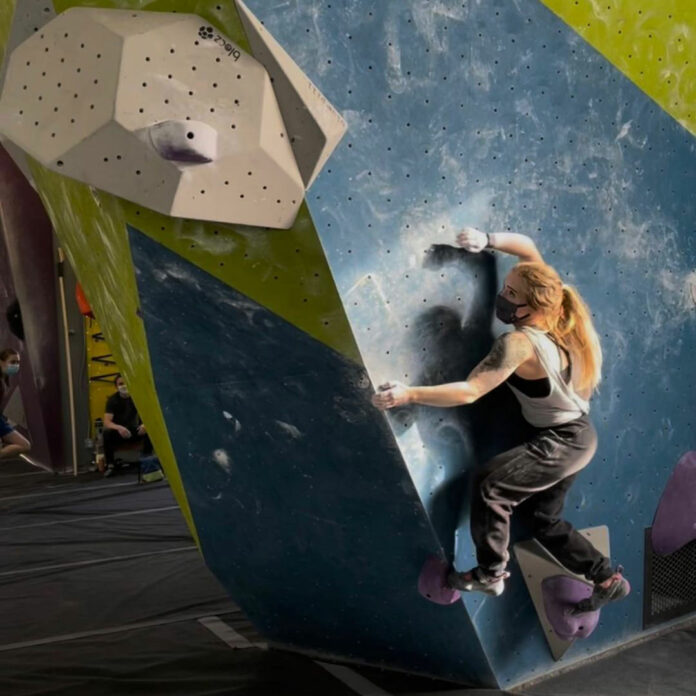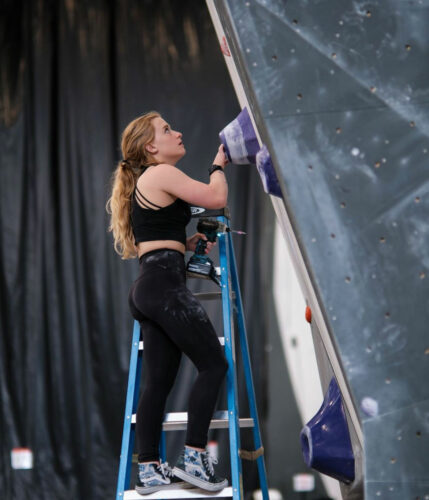
Behind the Wrench…is an ongoing series that interviews the “rock stars” of the climbing industry: the routesetters at the gyms. This time we’re chatting with Abby Wilson, whom I had set with at the Setter Showdown in February at Alta Boulders. Wilson is a setter with roots in Colorado and a home in Portland, Oregon. She is deep in the competition climbing scene, having recently obtained her USAC Level 3 Routesetter Certification and completed her first USAC Nationals Apprenticeship in Illinois. This year she took up a Head Setter position at Rock Haven in Gresham, Oregon. In her free time, Wilson surfs, hikes, and climbs hard.
Name: Abby Wilson
Title: Head Setter, Rock Haven
Location: Portland, Oregon
CHEN: Tell us about your path to becoming a climber and routesetter.
WILSON: I found climbing at a birthday party at the Boulder Rock Club when I was 11 years old. It was a fairly typical path for a gym rat from there. I joined a climbing club and then a competitive climbing team. I started working at the gym when I was 15 or 16, and after I aged out of the team—it was interesting because I had no intention of routesetting, which happened by accident. The Head Setter was stoked that I could pull hard and asked if I wanted to try out for an open position. After my first route, I was hooked instantly. I knew this was what I wanted to do.
It was a natural progression from apprenticeship to part-time work to full-time work. Sometimes I take on independent contract work for other gyms, competitions and events.
Abby, this might be an odd question, but what’s your height and wingspan?
4’10 with a zero ape-index; I’m a square. Ten out of ten times, I’m the shortest person unless there is a child. Actually, a lot of children are taller than me.
How has your height and wingspan influenced your introduction to climbing and routesetting?
I was always the shortest competitor and the shortest kid at practice. As a kid, I didn’t notice or let it bother me as much. When I began commercially setting, I think it negatively impacted where I placed footholds. It took work to expand my box size. I don’t want to box out 90% of adult climbers. The primary member base at most gyms is adults, not kids. On the flip side, it’s an excellent insight when setting USAC youth qualifiers and competitions. I can empathize with shorter climbers and kids.
Being on the far end of the height spectrum has given me a good perspective on climbing and training. My height means I need to be powerful or find an alternative beta to the common one. It’s made me work harder.
Both my height and gender impacted my introduction to routesetting. I took a routesetting apprenticeship early on in my career. There was only one other female setter on the crew. It felt as if I was brought on to tick a diversity box, set the “gentle technical boulders,” and do reach checks. It also fostered this negative competitive mindset between myself and the other female setter. It felt like there was only room for one of us.
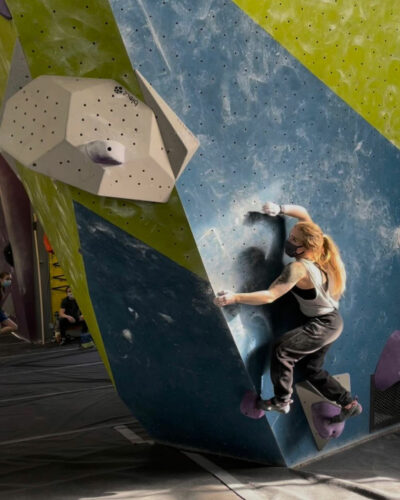
I’m sorry to hear that. I can empathize. How did that situation pan out?
It didn’t. Eventually, I left that position for another gym. It opened my eyes, though. The bubble of the routesetting industry feels so small and so competitive. Once you’re in the boys’ club, and it seems like there’s only one spot for someone like you, why would you want to bring more people in? I realized how toxic and counter-productive this thought process was, and I had to break out of it. I think part of that comes with growing up. I’m only 23 and still have a lot to learn. I hope to be a part of the shift in creating a comfortable space for everyone. At the end of the day, it’s a product-oriented trade; there’s so much talent out there, we need to be opening doors and creating space. No more of this “boys’ club” nonsense.
At the Setter Showdown you and I participated in, female setters made up a third of the participants. How did that make you feel?
It was so sick to be around such good company. I’m naturally somewhat quiet, so when I am the only female setter on a crew, I feel like I need to meet the societal standard that women are accommodating, kind and caring. There’s also pressure to prove that you belong. I feel the need to work twice as hard as all the men and climb just as hard. When I can’t reach something, I jump. I need to explain that it’s not a strength or a climbing ability issue, and two extra foot chips can make the climb much more equitable.
Sometimes people are understanding, but a lot of the time they’re not. The constant need to prove your belonging is exhausting. That’s why it’s so sick to be in the company of other awesome female setters. I think it allowed me personally to speak up more and feel heard. I didn’t feel like I needed to “prove” myself like I do when I’m the only woman. It was really fun to work with others who could empathize with some of the things we are discussing here. It took the pressure off…I didn’t feel the same need to prove I belong. Don’t get me wrong; I love working with male setters. There is absolutely no hate here. I’m trying to voice some of the struggles that are still in our industry.
So at the Setter Showdown, with a better representation of all parts of the gender spectrum, it was a relief.
How have all these experiences influenced your setting? What is the primary driving force behind your setting philosophy?
Support and empathy. I think being an outlier (due to height) has really taught me that routesetting isn’t about you. You are not the focus; your audience is. That audience can be your gym membership base, youth competitors, or local competitors―it can be anyone. But it rarely, if ever, is about you. If you have a home wall, set whatever you want for yourself!
We set on teams for a reason; everyone has something important and rad to bring to the table. Listen to your team. Trust them.
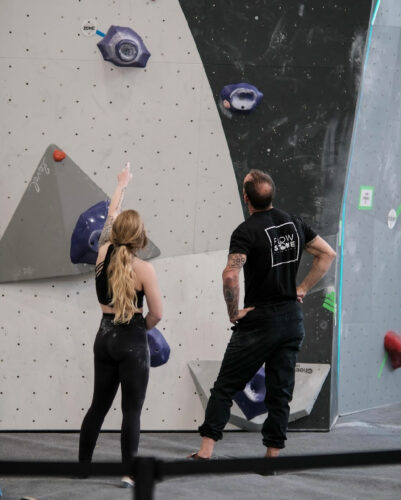
Abby, from my research before talking with you, I know you are a huge advocator for mental health care. Can we talk about that?
We’ve made huge strides in mental health care, but there is still a lot of stigmatism surrounding the topic. I think there is still the idea of talking about mental health as “oversharing” or “problematic.” I feel as though there is a lot of apprehension around the idea that people will be looking at you as “the anxious person” and not looking at your talents and your work. There’s still a “deal with it behind closed doors” mentality.
You can call in sick if you catch the flu. That’s acceptable. You can’t do the same if you have a depressive episode. I know people who lie when they do call in sick because of a depressive episode. They might say, “I have a cold,” or “my back pain is acting up.”
I deal with intense anxiety and panic attacks. It can feel lonely as if I’m the only person dealing with it. I know that’s not true. I used to be quite vocal about it on social media, but I stopped because I lack the energy to have open conversations via a screen. But that doesn’t mean I don’t talk about it. I’m an open book for anyone who wants to talk about it―my teammates and my friends know this. Most of my conversations around my mental health and mental health in general are happening in real-time with the people I’m engaging with daily. The more we talk about it, the less weird it is. Someone may need that to feel less alone.
What can we do as an industry to destigmatize mental health issues? Any specific advice for head setters out there?
It goes back to my philosophy of support and empathy, right? When we set for the younger kids, we put ourselves in their shoes to ensure equitable climbs. Take this approach if you notice a team member dealing with something. It can be as big as a loved one passing away or as small as not getting picked for your L2.
Stepping into my role as Head Setter at Rock Haven, I’ve put a really big emphasis on mental health. We have a list of resources hanging in our break room; we take small “check-out” breaks throughout the day. You are a better routesetter and human the healthier your brain space is. To me, it makes sense to put this much energy into keeping the people on my team comfortable and healthy.
Caring for someone dealing with mental health issues, or even a physical health issue, is at the core of a good routesetting team.
Why is that?
People do their best work if they show up and be honest with what’s going on. Routesetting is creatively, mentally and physically taxing. You’re stronger if you’re honest with your team and with yourself. There needs to be team cohesion and room for communication.
As someone who deals with panic attacks, setting is when my brain “turns off” from what I’m anxious about. Sure, I still get stressed about my routes and problems; I overthink sequences as any other setter would. But when I’m setting, it’s just about setting. The clutter fades away. I’m lucky, I know. I genuinely find so much joy in creating movement.
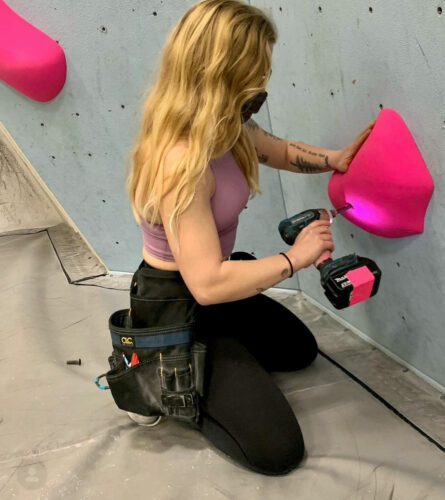
Thank you for your honesty, Abby. Let’s end on a lighthearted topic. What are you most excited about in the coming years?
Oh, so many things. I’m excited to see the different styles of competitions that gyms are hosting; all-women, queer, paraclimbing…you name it. I’ll never get enough of new shapes. I’m excited to see people starting to speak up and create safer spaces for underrepresented populations in the climbing community. Seeing the gender disparity slowly shift to an equal standing makes me excited and fulfilled. I’m excited to see my career path move forward. If I get the opportunity to work with even 1/10th of the setters in the country, that would be so cool!
Holly, thank you. Thank you for giving me a space to share some thoughts and for doing this series!
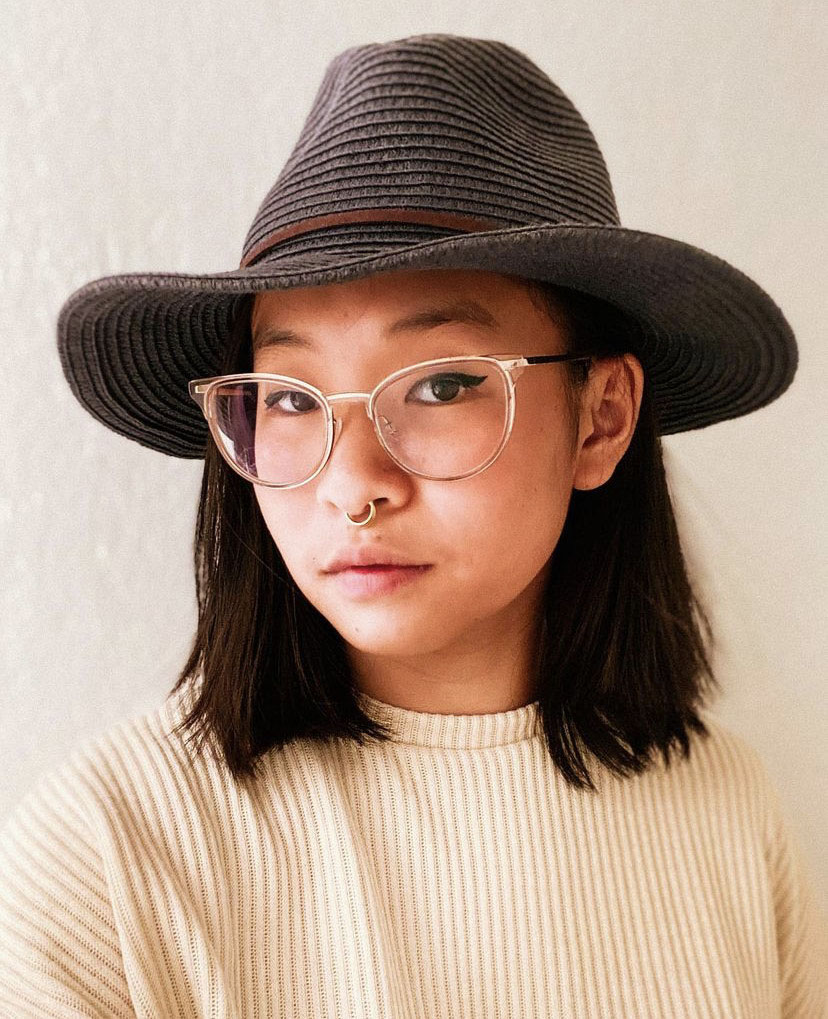
Holly grew up in Taiwan and Hong Kong. Now she lives in Denver where she reports, writes and routesets. Beyond the Climbing Business Journal, her writing has been published by Alpinist Magazine, Climbing Magazine, Gym Climber and Sharp End Publishing. Holly’s motto has always been: “keep it interesting.”
Read our interview with Holly: Storytelling Through Movement



